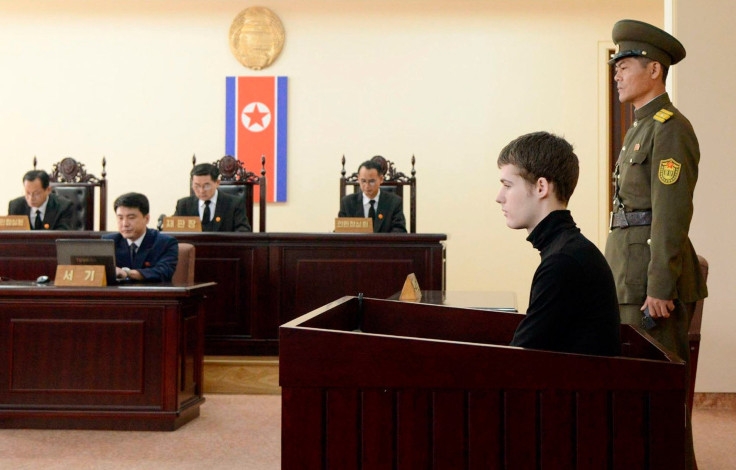Matthew Miller, American Held In North Korea, Went On 'Vacation' In Stalinist State's Prisons

Matthew Todd Miller, a 25-year-old California native, made international headlines after attempting to claim political asylum in North Korea, tearing up his tourist visa, and seemingly doing everything that he could to get arrested in the reclusive Stalinist state.
Now, Miller has revealed in interviews with the website NKNews.org, that he actively sought to be taken prisoner in North Korea, in order to allow him to “speak to an ordinary North Korean person about normal things.” Miller was put on trial in North Korea on Sept. 14, and sentenced to six years hard labor for committing “hostile acts” against the state. It was however, surprisingly difficult for the American to get himself before a North Korean court.
“I went to North Korea to... be detained,” Miller told NKNews. “My main fear was that they would not arrest me when I arrived.
“I was trying to stay in the country,” said Miller. “They wanted me to leave. The very first night they said, ‘We want you to leave on the next flight.’ But I refused. I just did not leave.”
According to NKNews.org, Miller was not formally taken into custody by North Korean authorities until 15 days after he arrived in the country.
In addition to tearing up his tourist visa at Pyongyang airport, Miller had filled a notebook with writing that claimed, among other things, that he was a “hacker,” that he was in possession of important U.S. military secrets, and that he wanted to get U.S. military forces out of South Korea.
“Seeking asylum to avoid imprisonment,” the notebook said. “My agenda is to remove the American military from South Korea. In this process I attempted to access files from the bases [of] American military in South Korea. In the past, I was involved with Wikileaks. The American military is expanding its influence in Asia which I oppose.”
Miller admitted in the interview that he had gone over the top with his notebook saying, “it was filled with a number of extravagant things… [North Korean authorities] instantly knew it was false and wanted to know my true purpose of visiting.”
A profile of Miller by the Reuters news agency painted a picture of a man who did not have close friends, a regular job or a means of supporting himself during the protracted period he spent in Asia, prior to his detention in North Korea.
Miller was also reportedly obsessed with “Alice In Wonderland,” the classic Lewis Caroll work.
After his trial and sentencing, Miller appeared in a video circulated by international media, describing his prison experience in North Korea as “eight hours of work per day. Mostly it's been agriculture, like in the dirt, digging around. Other than that, it's isolation, no contact with anyone,” he said.
Miller was eventually returned to the United States, along with fellow U.S. detainee Kenneth Bae, after Director of U.S. National Intelligence James Clapper visited Pyongyang, bearing a letter from U.S. President Barack Obama, which apologized for both men's crimes.
Miller and Bae were the last Americans to be held in North Korean custody, after Jeffry Fowle, a U.S. citizen who was held for leaving a Bible in a North Korean hotel room, and was released in October.
Clapper had suggested that North Korean authorities were “disappointed” that he was not there to negotiate some kind of diplomatic breakthrough. North Korea has a history of exchanging U.S. hostages for political favors. In 2009, American journalists Laura Ling and Euna Lee were released by North Korea in exchange for a visit from former President Bill Clinton.
For his part, Miller appears to be regretful about the costs of his journey through the North Korean looking glass.
"I was in control of my situation. I knew the risks and consequences. My trip has probably resulted in no change for anyone, except for me. I do feel guilt for the crime. It was a crime. I wasted a lot of time of the North Koreans’ and the Americans’, of all of the officials who spent time with my case,” he said, according to NKNews.
© Copyright IBTimes 2024. All rights reserved.






















